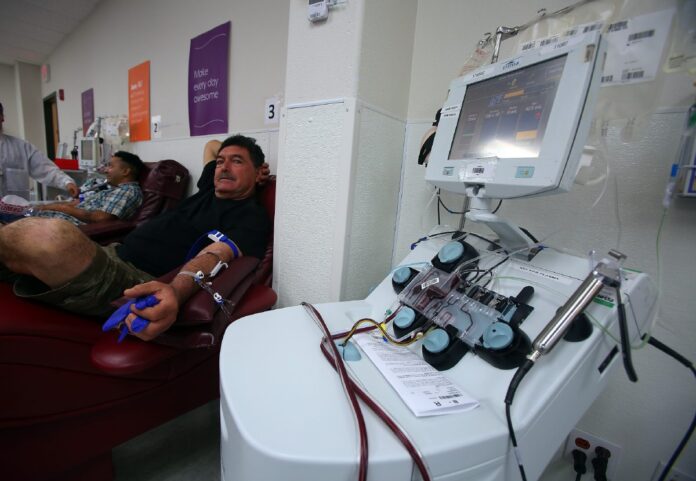
Concerns about the coronavirus pandemic have pushed the blood donation infrastructure in South Texas to the verge of collapsing.
Blood drives across the Rio Grande Valley have been cancelled and regular donors have not been coming in — all at a time when preparedness in health centers is more critical than ever, according to Vitalant, the area’s largest donation center.
Vitalant regional director Frank Esparza says the supply has taken a significant hit from fears of the pandemic. The center aims to keep at least four days of supply on hand, which is about 500 units.
“Right now, we have about a two-day supply, about 250 units,” Esparza said. “Our donations have dropped significantly, especially in the last week. And if the trend continues with donations decreasing, we may be getting to the point when we can’t supply everything that our hospitals need.”
According to Esparza, about 60% of their blood supply comes from drives, more than half of which take place in school settings. With schools extending Spring Break and universities transitioning to online courses, many drives have been canceled, putting blood banks at a critically low supply level.
“This is unprecedented for blood banks, to have so many cancellations of drives in such a short time,” said Esaprza, who has directed the organization for the past 12 years.
Vitalant’s McAllen and Harlingen locations provide for 10 hospitals across the Rio Grande Valley, Esparza said. Blood shortages impact patients who need surgeries, victims of car accidents and other emergencies. Vitalant also collects platelets, which are essential for those fighting cancer.
Esparza emphasized that the public should not be worried about contracting COVID-19 while donating blood.
“People are afraid to donate, they think they are at risk of getting the coronavirus but that is not the case,” he said. “They are not going to get it at a blood center. We are taking all the recommended precautions and are following everything we are mandated to do to make sure our offices and clinics are disinfected.
“It is safe to donate.”
Though the Centers of Disease Control Prevention recommends against gatherings of 50 or more, Esparza said that the organization does not classify blood drives as such — they are considered health care necessities.
He added that donating blood will not compromise the donor’s immune system, and that in a time of uncertainty and feelings of helplessness, this is how people can support their health care centers.
“Blood has to be given by someone else. One individual is going to save another individual, and that is the only way this can work,” Esparza said. “We need to get back to normal.”
Anyone over the age of 16 and in good health qualifies to donate blood, a process that takes less than an hour. Donors can give every 56 days, and must weigh at least 110 pounds.
“If anyone is uncomfortable going to a drive, they can come to the center. They are saving three lives with every donation. It is very important that we get support from everyone out there, especially right now,” Esparza said.
Vitalant’s blood banks are located on 1400 S. Sixth St. in McAllen, and 610 N. Ed Carey Dr., in Harlingen. Both offices are open every day of the week. Times and more information on how to donate can be found on their website, https://www.vitalant.org/Locations2/Rio-Grande-Valley/McAllen-,-Texas-Center.aspx.



